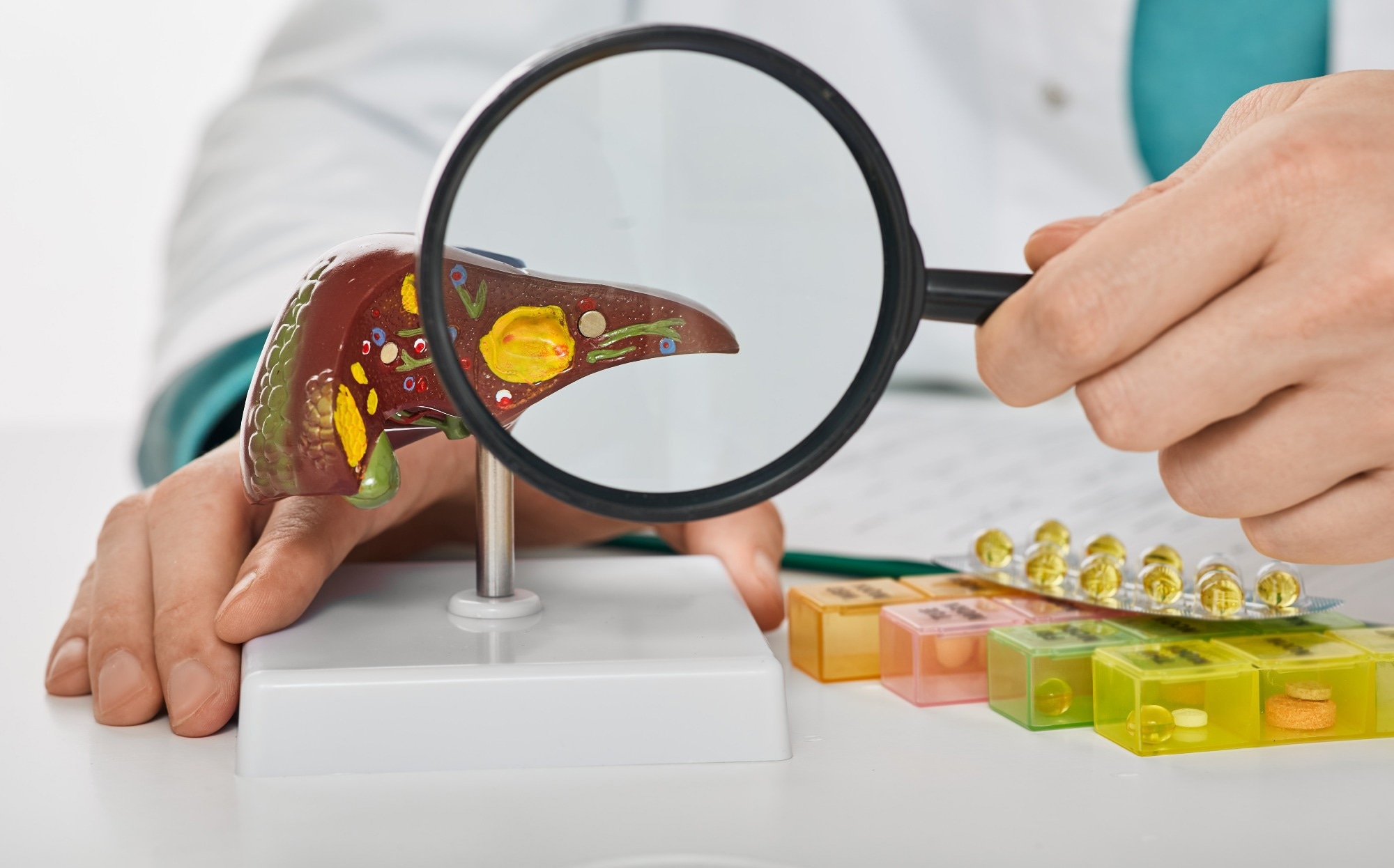Study links lifestyle choices and gender to severity of fatty liver disease in workers
https://reurl.cc/E19jjg
By Dr. Chinta SidharthanNov 15 2023Reviewed by Benedette Cuffari, M.Sc.
In a recent study published in the journal Nutrients, researchers determine whether certain factors such as lifestyle, gender, and risks of inflammation, liver dysfunction, and metabolic abnormalities correlate with the severity of fatty liver disease.
 Study: Unraveling the Connection between Fatty Liver Severity with Gender, Lifestyle, and Health Risks among Workers. Image Credit: Peakstock / Shutterstock.com Study: Unraveling the Connection between Fatty Liver Severity with Gender, Lifestyle, and Health Risks among Workers. Image Credit: Peakstock / Shutterstock.com
Background
Non-alcoholic fatty liver disease is believed to afflict one-third of the global population, with its prevalence within Asia estimated to be about 30%. Moreover, several studies have reported incidence rates ranging between 28% and 52% among adults between the ages of 17 and 65 years.
Non-alcoholic fatty liver disease increases the risk of multisystemic illnesses such as metabolic abnormalities, cardiovascular disease, renal problems, and type 2 diabetes. Furthermore, this disease can progress to liver cirrhosis, acute hepatitis, and eventually hepatocellular carcinoma.
Genetic, metabolic, epigenetic, and lifestyle-associated factors can contribute to the etiology of fatty liver disease. Individuals who are genetically susceptible to the disease are at risk of developing fatty liver disease when sedentary and participating in unhealthy lifestyles, which leads to fat accumulation and adiposity. Increasing evidence also suggests that gender might be a significant determinant of fatty liver disease risk.
About the study
The present study was conducted as part of Taiwan's workplace health promotion scheme, which aims to periodically evaluate the requirements and hazards related to employees' health. Participation in the study was voluntary, and each participant was asked to respond to a questionnaire with a health personnel coding all responses for anonymity and confidentiality.
Individuals above the age of 20 from three of central Taiwan's industrial enterprises involved in manufacturing transportation equipment, automobile parts, and electronic components were recruited for the study. Lifestyle habits related to health, including physical activity levels, dietary choices, alcohol consumption, and smoking behavior, were assessed through a self-administered questionnaire. The categories on nutrition and exercise included nine and eight elements, respectively, with responses graded on a four-point Likert scale.
The nutrition categories pertained to choices of low-fat diet, restricted sugar consumption, consumption of fruits, vegetables, cereals, poultry, eggs, nuts, fish, meat, legumes, and dairy, as well as knowledge of the nutritional content of foods based on food labels. The exercise category examined engagement in and adherence to physical activity, frequency and intensity of physical activity, and pulse and heart rate monitoring during exercise.
Based on smoking behavior, the participants were classified as non-smokers, occasional smokers, or daily smokers. Alcohol consumption was categorized as occasional and daily drinking.
Ultrasound images were used to assess the severity of fatty liver, with grades including the absence of mild, moderate, and severe fatty liver. Data such as systolic and diastolic blood pressure, waist circumference, triglyceride levels, fasting blood glucose, and levels of high-density lipoprotein were also gathered to assess metabolic risk factors.
 Antibodies eBook Compilation of the top interviews, articles, and news in the last year.Download the latest edition Antibodies eBook Compilation of the top interviews, articles, and news in the last year.Download the latest edition
Platelet and white blood cell assays were performed to identify cardiovascular and inflammatory biomarkers. Glutamate pyruvate transaminase and glutamate oxaloacetate transaminase levels were also measured to assess liver function.
Study findings
A gender-based trend in the prevalence of fatty liver, unhealthy lifestyle choices, and health risks was observed, with men at a greater risk than women. Approximately 45% of the participants had fatty liver. Moreover, the scores from the health behavior questionnaires showed that physical activity levels and fatty liver severity were negatively correlated.
Current alcohol drinkers in the categories of fatty liver severity varied, with the group having no fatty liver comprising 43% current alcohol drinkers and mild, moderate, and severe fatty liver categories consisting of 48.4%, 44.8%, and 63.4% current alcohol drinkers, respectively.
The severity of fatty liver was associated with a higher risk of metabolic abnormalities. Liver dysfunction and inflammation also exhibited a positive correlation with fatty liver severity.
The higher prevalence of non-alcoholic fatty liver among men as compared to women could be explained by variations in lifestyle habits between males and females in the Taiwanese population. Male workers were observed to engage in unhealthier lifestyle habits such as poor dietary choices, increased smoking, and higher alcohol consumption than female workers. Other studies have also reported that women are more engaged in health-promoting lifestyle habits and choices.
Severe fatty liver was associated with certain parameters indicating a higher risk of cardiovascular disease and metabolic abnormalities, such as higher blood pressure, larger waist circumference, and elevated triglyceride levels.
Conclusions
Among the population of Taiwanese workers examined in the current study, fatty liver had a 45.5% prevalence, with men at a greater risk of fatty liver and other associated health risks than women. The prevalence of non-alcoholic fatty liver was correlated with lower physical activity levels, as well as unhealthy lifestyle habits such as poor diet, smoking behavior, and high alcohol intake.
The risk of liver dysfunction and inflammation was also higher for individuals with severe fatty liver. These findings highlight the need to promote health-enhancing lifestyle choices.
Journal reference:
- Tang, F., Li, R., & Huang, J. (2023). Unraveling the Connection between Fatty Liver Severity with Gender, Lifestyle, and Health Risks among Workers. Nutrients 15(22). doi:10.3390/nu15224765
|